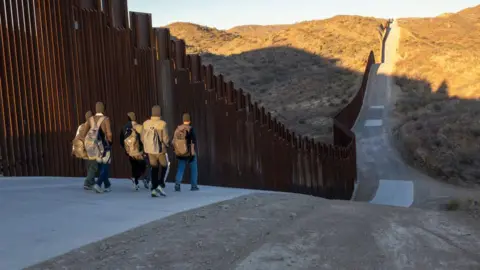Nadine YoussefBBC News, Toronto
 BBC News
BBC NewsIn a quiet and calm suburb of Toronto, a 30 -year -old Afghan woman spends most of the afternoon on the phone, hoping that she can reach her younger brother and father.
They are not in Afghanistan, but instead just a miles away, across the border in the United States, detained in the detention of immigration and customs (ICE).
The three were present in the crowded cells for several months, stuck while their lawyers say it folded the bureaucratic fabric between Canada and the United States.
They are qualified to obtain asylum in Canada because they have direct relatives who are legal refugees in the country, but they can only submit their demands on the land borders – and American officials insist that they will not be released unless they enter Canada by air, which they cannot do without a visa, according to their lawyer in the United States BBC.
The visa application is currently being reviewed and still stuck, is currently unable to make a claim in Canada and countering the deportation from the United States.
From her home near Toronto, Assal says she tried everything to release them. BBC uses the pseudonym because her family belongs to a group of ethnic and religious minorities facing persecution in Afghanistan.
Lawyers in both countries have rented pressure on their case and offered even the costs of the ice agents who accompany them to the Canadian American border, but to no avail.
The family issue explains how some asylum seekers have fallen into quick -change policies under the Trump administration, says their lawyers and experts. It also raises questions about whether Canada is responsible for expediting entry to people with ice detention who have ties with this country.
Meanwhile, members of the Asal family can be sent to Afghanistan or a third country they do not choose – “the most terrifying step for all,” their American lawyer Judy Godwin says. She said that this option “exposes them to the risk of sending them to God knows where, without any guarantees of protection.”
Asal said that the father was working with the American forces as a contractor, which made him a possible goal for Taliban if he returned to Afghanistan.
Over the past eight months, Mrs. Godwin has been working to prevent the American authorities from sending the family to her country of origin.
Meanwhile, their lawyers in Canada were pressuring the authorities to grant the visas they needed to get a plane. In light of the immigration agreement between Canada and the United States – the third safe country agreement – immigrants who do not have a visa to claim the use of asylum in the land border crossing must.
Astel talks to her detained family when she can. Ice allows online “visits”, often reaching her 18 -year -old sister.
In a recent call, she was made using the iPad that she shares with about 80 other cell colleagues, her sister presented her daily life details – her struggle to get a good night comfort, and her habit was washing just to keep a busy – before she exploded in crying.
In the Canadian legal commitments with the British Broadcasting Corporation, she stated that she had “shocked” the circumstances in detention of ice.
“Every aspect of our lives is controlled, although we are not criminals,” she said.
Describes the tape is inspected, and “food is not suitable for air” and how prisoners who refuse to eat are threatened with “solitary confinement.”
The BBC sought to hang from the ice. Administration officials have previously defended reports of bad conditions in the United States migrant detention facilities.
A family and other family says they are struggling to obtain information about the well -being of the detainees, including the younger brother who was accepted to the hospital for 10 days due to seizures and is now due to the detention of ice.
 Gety pictures
Gety pictures“They did not reach their papers in a timely manner.”
The British Broadcasting Corporation said: The first part of the family, which included asking and two brothers, arrived in Canada in February 2023.
Their preferred destination was after Afghanistan fled reluctantly as violence escalated quickly after the Taliban took over.
They moved to Iran and from there to Brazil and then praying to the United States, where they held the ice for four days before heading to the northern border and crossing into Canada via the Roxham road, at that time an informal but informal crossing between New York and Cibec. Once in Canada, they successfully presented asylum.
“He is safe. There is security, and society is good.”
In August 2024, more family members were able to leave Afghanistan and arrived in Canada after a similar path.
But by the time when the final group – her mother, her father, and her three siblings – took the journey, the policy in North America has turned.
Roxham Road – this informal way for thousands of asylum seekers entering Canada between 2017 and 2023 – was closed, and the United States was struggling to deal with a group of immigrants in its southern border.
After trying to feed the legal options for the United States entering from Mexico, in December, the family of the remaining family for smuggling across the border, then surrendered to the authorities.
In February, Asal’s mother and one of her sisters were released shortly after Trump took office and signed an executive order that broadens and deported migrants detention, and set their way to Canada.
But the remaining three are still in the ice custody, as the American authorities refuse to release them Under the new rulesMrs. Godwin says.
The fact that they were not released with others in February came to a bad time.
Ms. Godwin says that one of the officials told her, “They did not reach their papers in a timely manner.”
 BBC News
BBC NewsIn response to questions from the British Broadcasting Corporation about the family’s issue, a senior US Department of Internal Security Ministry (DHS) says, “ICE will return them happily to their country of origin” if they ask for a voluntary exit.
They add that the United States “will not explode illegal foreigners who are looking to resort from our country to Canada and vice versa. This is part of being good neighbors and partners.”
Adam Sadinski, a Canadian lawyer in the family, said that Canada has an opportunity to allow this family to reunite.
“We do not want Canada to be complicit in this treatment, and the potential result that can be sent to any number of countries with a distant human rights record,” he says to BBC.
Mr. Sadinski also argues that allowing them to enter Canada will be in line with the secure third state agreement, which contains exemptions aimed at reuniting families.
In a BBC statement, immigration, refugees and citizenship in Canada says it will not comment on the family issue, noting that privacy legislation.
Richard Corland, the immigration lawyer, says the case is a mystery for Canadian officials.
Mr. Corland, who is not involved in their case, told BBC that allowing to enter the family can put a precedent for others in detention of ice with relations with Canada. “How can you say” yes “to only one family, and then,” no “for everyone?”
But he adds that he believes that both Canada and the United States bear at least responsibility for ensuring that the family does not send to Afghanistan.
“It is cruel to exclude the United States, Kabul’s journey,” he said. “Americans know what is in the store, because they were there in Kabul for more than 20 years.”
Currently, Asal and her family in Canada are still in pain on the issue, wishing to reunite.
“Trust me when I say I cannot sleep most of the night,” she said.
But she hopes that Canadian officials will come and “will not leave us alone in this situation.”
https://ichef.bbci.co.uk/news/1024/branded_news/6652/live/5a034df0-88cb-11f0-85f1-5f1042c3058b.jpg
2025-09-03 23:19:00














